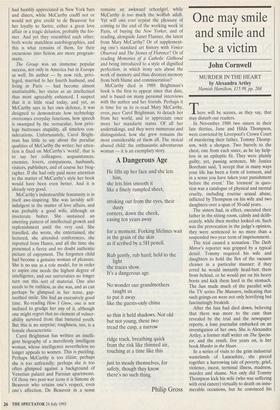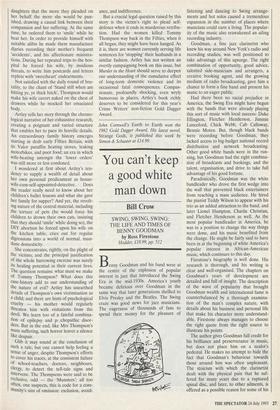One may smile and smile and be a victim
John Cornwell
MURDER IN THE HEART by Alexandra Artley Hamish Hamilton, f15.99, pp. 268 There will be scenes, as they say, that may disturb our readers.
In November 1988 two sisters in their late thirties, June and Hilda Thompson, were convicted by Liverpool's Crown Court of murdering their father, Tommy Thomp- son, with a shotgun. Two barrels to the chest, one from each sister, as he lay help- less in an epileptic fit. They were plainly guilty; yet, passing sentence, Mr Justice Boreham said, 'I accept that in many ways your life has been a form of torment, and in a sense you have taken your punishment before the event.' The 'torment' in ques- tion was a catalogue of physical and mental cruelty, including routine sexual abuse, inflicted by Thompson on his wife and two daughters over a span of 30-odd years.
The sisters had, in effect, executed their father in the sitting room, calmly and delib- erately, while their mother looked on. Such was the provocation in the judge's opinion, they were sentenced to no more than a suspended two-year term of imprisonment.
The trial caused a sensation. The Daily Mirror's reporter was gripped by a typical detail: Tommy required his wife and daughters to hold the flex of the vacuum cleaner in a particular manner; if they erred he would instantly head-butt them from behind, or he would put on his heavy boots and kick them hard in the stomach. The Sun made much of the parallel with the TV series The Munsters, indicating that such goings-on were not only horrifying but fascinatingly freakish.
After the fuss had died down, believing that there was more to the case than revealed by the trial and the newspaper reports, a lone journalist embarked on an investigation of her own. She is Alexandra Artley, a former staff writer on The Specta- tor, and the result, five years on, is her book Murder in the Heart.
In a series of visits to the grim industrial wastelands of Lancashire, she pieced together a harrowing tale of poverty, grief, violence, incest, terminal illness, madness, murder and shame. Not only did Tommy Thompson kick his wife (who was suffering with oral cancer) virtually to death on innu- merable occasions, but he convinced his daughters that the more they pleaded on her behalf the more she would be pun- ished, drawing a causal link between their compassion and her suffering. At the same time, he ordered them to 'smile' while he beat her. In order to provide himself with suitable alibis he made them manufacture diaries recording their mother's frequent `accidents', and his affectionate ministra- tions. During her repeated trips to the hos- pital he forced his wife, by insidious threats, to write him postcards and letters replete with `sweetheart' endearments.
Not satisfied with the daily round of bru- tality, to the chant of `Stand still when am hitting ye, ye thick bitch', Thompson would make his wife cavort naked on the chest of drawers while he mocked her emaciated body.
Artley tells her story through the chrono- logical narrative of her exhaustive research, creating a poignant and varied structure that enables her to pace its horrific details. An extraordinary family history emerges starting in drab early Fifties Britain, with its Valor paraffin heating stoves, leaking motorbikes, and poor food; an era in which wife-beating amongst the 'lower orders' was still more or less condoned.
I wondered at first about Artley's ten- dency to supply a wealth of detail about her own personal predicament as house- wife-cum-self-appointed-detective. Does the reader really need to know about her children's ballet lessons and what she gave her family for supper? And yet, the revolt- ing nature of the central material, including the torture of pets (he would force his children to drown their own cats, insisting that they should 'smile' while doing so), the DIY abortion he forced upon his wife on the kitchen table, cries out for regular digressions into a world of normal, mun- dane domesticity.
She concentrates, rightly, on the plight of the victims; and the principal justification of the whole harrowing exercise was surely its healing potential in their current lives. The question remains: what must we make of Tommy Thompson? What does this case-history add to our understanding of the nature of evil? Artley has unearthed details of Thompson's own victimisation as a child; and there are hints of psychological cruelty — his mother would regularly threaten him with visitations from the devil. We learn too of a fateful combina- tion of epilepsy and pt jchopathic disor- ders. But in the end, like Mrs Thompson's Mute suffering, such horror leaves a silence like despair.
Glib it may sound at the conclusion of such a tale, but one cannot help feeling a sense of anger, despite Thompson's efforts to cover his traces, at the consistent failure of school-teachers, doctors, neighbours, clergy, to detect the tell-tale signs and intervene. The Thompsons were said to be reclusive, odd — the `Munsters'; all too often, one suspects, this is code for a com- munity's sins of omission: exclusion, avoid-
ance, and indifference.
But a crucial legal question raised by this story is the victim's right to plead self- defence when it ends in murderous retribu- tion. Had the women killed Tommy Thompson way back in the Fifties, when it all began, they might have been hanged. As it is, there are women currently serving life sentences for 'stopping' their husbands in a similar fashion. Artley has not written an overtly campaigning book on this issue, but Murder in the Heart should serve to deepen our understanding of the cumulative effect of long-term domestic violence and its occasional fatal consequences. Compas- sionate, profoundly shocking, even wryly humorous in places, Artley's book richly deserves to be considered for this year's Crime Writers' non-fiction Gold Dagger Award.
John Comwell's Earth to Earth won the 1982 Gold Dagger Award. His latest novel, Strange Gods, is published this week by Simon & Schuster at £14.99.



















































 Previous page
Previous page